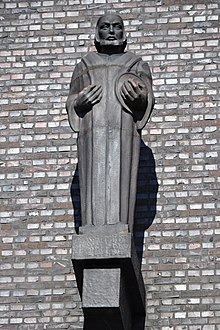Johann Wetken

Johann Wetken (* before 1470 in Hamburg ; † February 26, 1538 there ) was town clerk and Hamburg's first Protestant mayor .
Live and act
Johann Wetken, the first known member of the Hamburg patrician family Wetken , who had made significant contributions in the Hanseatic cities of Hamburg, Lübeck and Rostock and had provided several mayors, was enrolled at the University of Rostock in 1496 . Here he studied law, obtained his baccalaureate doctorate in 1497 and obtained a master's degree three years later . On May 8, 1503, Wetken was enrolled at the University of Greifswald , in the summer of the same year accepted into the local artist faculty, whose Dean's office he took over in 1504 and 1506, and taught here for a few years. In 1505 Wetken also headed the rectorate of Greifswald University. Wetken then accepted an offer from his hometown Hamburg, which appointed him council secretary and thus also city clerk, since according to earlier reform decisions of Emperor Sigismund the city clerk had to be a public notary at the same time . In addition, it was common in Hamburg at the time that these town clerks should not be married. But Wetken was not bothered by it and around 1510 married Margarethe von Spreckelsen, the daughter of the Hamburg mayor Johann von Spreckelsen, and was thus only the second person who did not adhere to this imperial “ celibacy ”.
At a time when Martin Luther was introducing the Reformation, Johann Wetken also began to be interested in this new movement. His key experience was when he was in Bremen as a delegate in 1525 with his incumbent mayor Hinrik Salsborch . Wetken was fascinated by how this now Protestant city opposed the machinations of Archbishop Christoph , a brother of Heinrich the Younger of Braunschweig . Here Wetken also got to know Hieronymus Schurff and appreciate his commitment to the Reformation and decided to openly join this new church movement and support it.
In the meantime, as early as 1524, the parish of St. Nikolai tried Johannes Bugenhagen , a companion of Luther, to replace the Catholic priest Henning Pillowbrugge, but the previously conservative council voted against it and pillowbrugge remained in office for another four years. But with Wetken's election to the City Council of Hamburg in the spring of 1526 and two years later on March 12, 1528 as Mayor of Hamburg , succeeding Gerhard von Holte, who had already given up in Hamburg due to the influence of the Reformation, changed the denominational attitude of the council. Just a few months after his election, Wetken was forced to mediate in a dispute between the Dominicans and the first Protestant preachers, and he also requested the support of the reformer Stephan Kempe . This finally took part in the great disputation in which he fought against these monks of the "old" doctrine. This conversation initially decided the church situation in Hamburg and Kempe himself wrote a report about it. Finally, on October 9, 1528, Johannes Bugenhagen was appointed as a preacher to St. Nikolai, who was now to finally enforce the new church order. The Hamburg Council reserved accommodation in the so-called Doktorei and organized a festive welcome dinner in this house in his honor, as well as an official and public welcome by the three Hamburg mayors, headed by Johann Wetken, the next day. But in a so-called long recess it was to take until May 15, 1529, until the new church constitution was finally adopted.
A few weeks later, in June 1529, Wetken had to settle another dispute with the cathedral chapter under the direction of Pillowbrugge, whose members invoked imperial privileges and claims for the cathedral. But Wetken and his second mayor Salsborch were able to persuade Pillowbrugge to declare that the owners of the clerical fiefdoms should bequeath capital and a pension to the church after their death and, in return, were allowed to keep the income from these fiefdoms for the rest of their lives.
Johann Wetken was thus significantly involved in the introduction and implementation of the Reformation in Hamburg and had ensured that this upheaval took place peacefully. His son, and later also Hamburg's mayor Hermann Wetken , played a part in consolidating this trend in church and society. Wetken remained mayor until 1533, then resigned for health reasons and finally died on February 26, 1538.
See also
literature
- Wilhelm Sillem: Wetken . In: Allgemeine Deutsche Biographie (ADB). Volume 42, Duncker & Humblot, Leipzig 1897, pp. 231-238.
- Hamburg church calendar 1962. (On behalf of the Evangelical Lutheran Church in the Hamburg State ... edited by Gerhard Bittner and Friedrich Hammer).
- Johann Gottfried Ludwig Kosegarten: History of the University of Greifswald with documentary enclosures . First part. Greifswald 1857, p. 169
Web links
Individual evidence
- ↑ See the entry of Johann Wetken's matriculation in the Rostock matriculation portal
- ↑ See the entry of Johann Wetken's bachelor's degree in the Rostock matriculation portal
- ↑ See the entry of Johann Wetken's master's degree in the Rostock matriculation portal
| personal data | |
|---|---|
| SURNAME | Wetken, Johann |
| BRIEF DESCRIPTION | German town clerk and mayor (Hamburg) |
| DATE OF BIRTH | before 1470 |
| PLACE OF BIRTH | Hamburg |
| DATE OF DEATH | February 26, 1538 |
| Place of death | Hamburg |